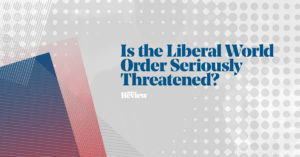 The United States is in the odd position of being both the world’s most ardent champion of the liberal order—meaning a rules-based, cooperative system of states that themselves profess liberal values—and one of its potential threats, according to Georgetown University’s Charles King:
The United States is in the odd position of being both the world’s most ardent champion of the liberal order—meaning a rules-based, cooperative system of states that themselves profess liberal values—and one of its potential threats, according to Georgetown University’s Charles King:
The point of liberal values—the ones embraced by many progressives, classical liberals, and mainstream conservatives alike—is not that they are timeless or guarantee happiness. It is that they rest on the one thing in social life we can all be sure of: that we will encounter other individuals, different from ourselves, with their own preferences, ambitions, and worldviews. Put aside the complicated metaphysics and speculative theology, and what is left is human beings struggling to patch a ship already at sea: to find ways to live together peacefully—and even prosper—in a changing, plural world.
In some quarters, there is a growing intuition that the problem with liberal democracy is not just the adjective. It is also the noun. Democracy and elections have no special claim to delivering the common good, King – a Journal of Democracy contributor – writes for Foreign Affairs.







